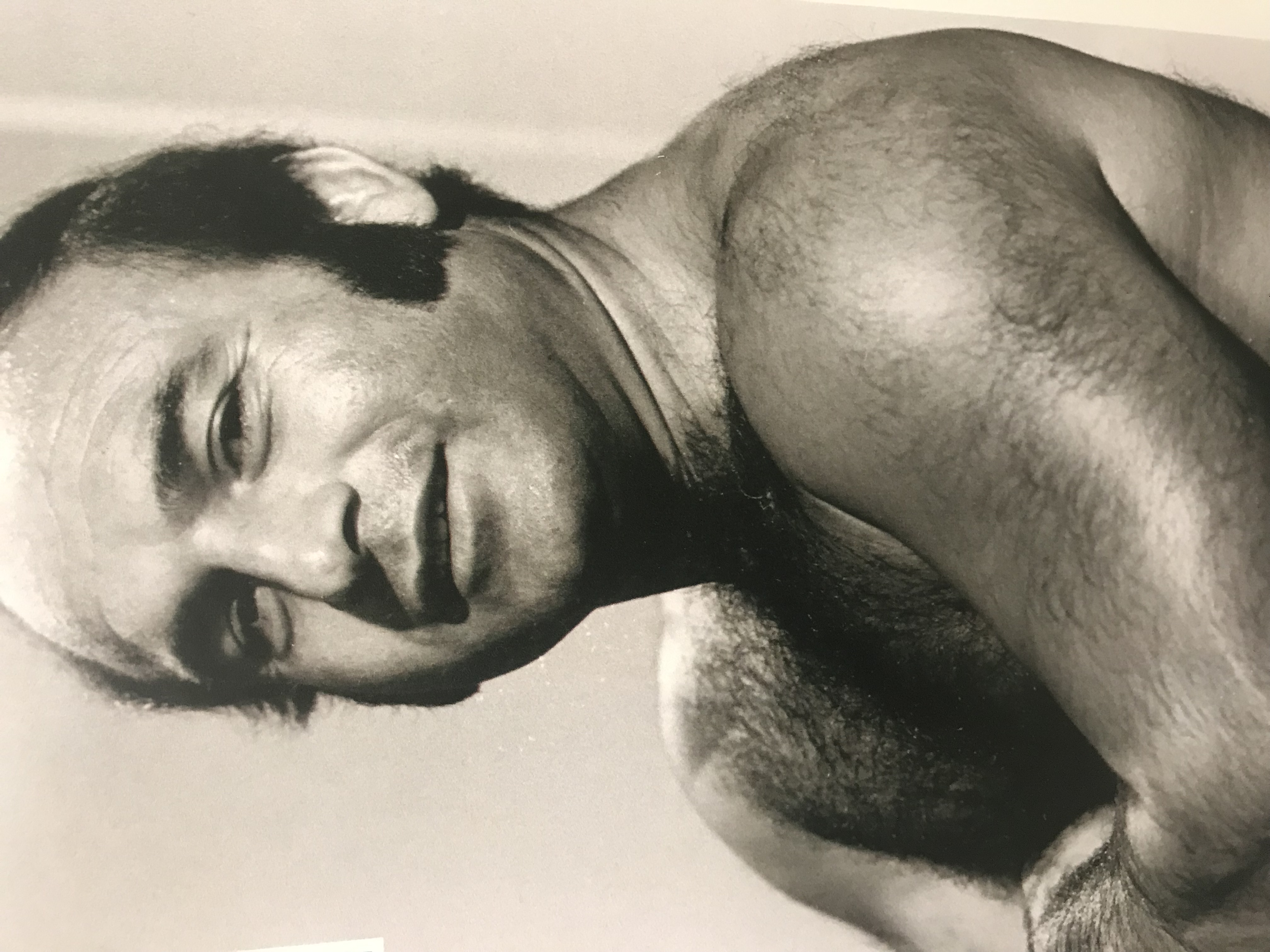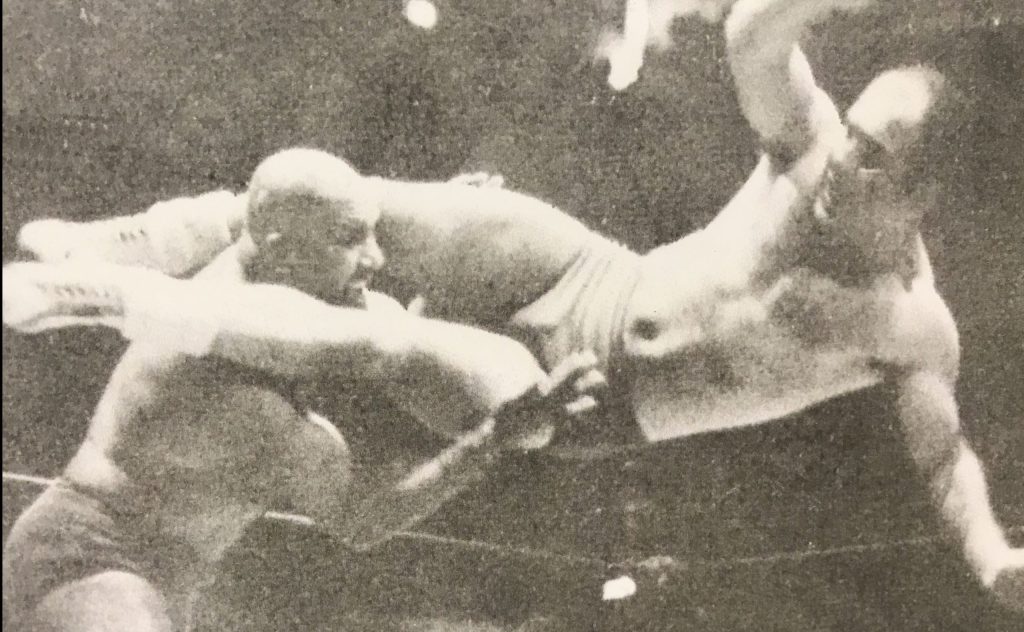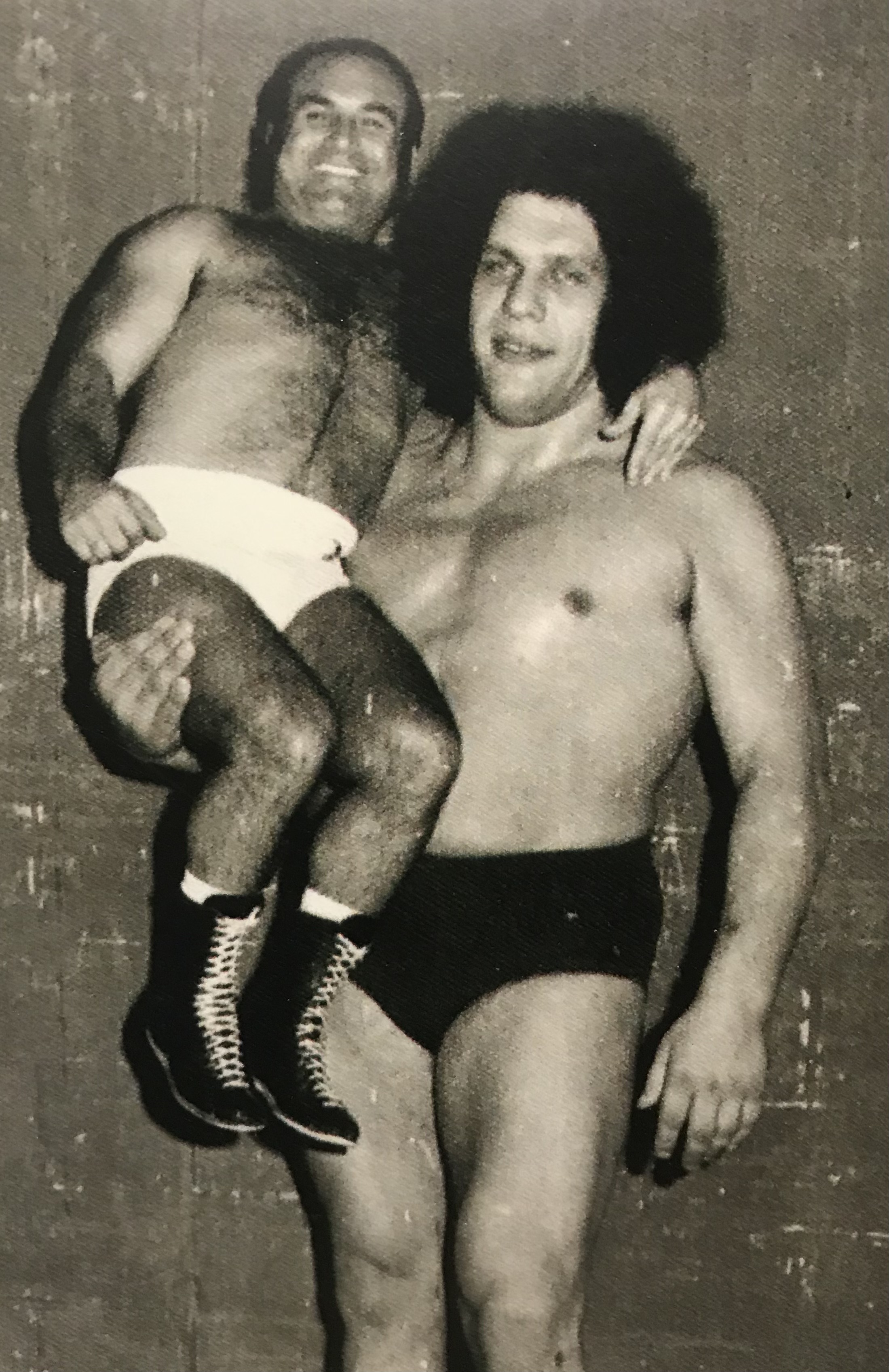Valerie Savvenas says her husband, Manoli, would have loved the mural of him — as the Flying Greek — on the brick wall of the old Woolworth building on the Park Central Square.
Since Manoli's death Dec. 31, she has closed Manoli's Jewelers at 2700 S. Glenstone Ave., which they owned and ran for decades.
They would have been married 50 years on Aug. 10.

She also has sold their Springfield home and now lives with a son, one of their three children, in Fayette, near Columbia.
Valerie and her son came to Springfield a few weeks ago to see the bright 18 feet by 20 feet mural of Manoli.
“We love it,” she says.
Still, she misses him and is grieving his death.
“Losing a spouse is very hard,” she says.
Looking back, she says, she was convinced by Manoli's confidence and spirit that he would overcome stage 4 cancer.
She has joined a Facebook group for those who have lost loved ones.
In the ring he took to the air

In the mural, Manoli is depicted as he was in his younger days — when he was Mike Pappas, “The Flying Greek,” professional wrestler. He retired from the squared circle at age 38.
Young Manoli stands with his arms across his bare chest. Behind him are blue mountains. He was born on the Greek island of Rhodes.
In the mornings, he once told me, he could see the mountains of Turkey some 28 miles across the Aegean Sea.
In the grand theater of pro wrestling, “Mike Pappas” sounded like a better Greek name than his real Greek name. It certainly was easier to pronounce.
Pappas performed in the 1960s, an era of gymnasium crowds and late-night TV coverage, on into 1978. He was a small, thick, wiry man with a hairy chest, mutton-chop sideburns and tight wrestling trunks.
Often, he was airborne, thus “the Flying Greek.”

Sometimes he was in the air delivering head-high scissors kicks. Or just as often, he took flight when a mountain-of-a-man catapulted him across the ring — or beyond.
He cautioned me to not call this part of pro wrestling “fake.” The pain and the damage to the body was real and lingering.
A jewelry store with pro wrestling memorabilia
You could not go into Manoli's Jewelers without discovering Savvenas had been a pro wrestler, despite being only 5-foot-4 and, at most, and 170 pounds.

One picture amid the displays of jewelry showed Pappas posing with wrestling legend Andre the Giant. In fact, for a while they were tag-team partners.
In contrast to Manoli, André René Roussimoff was 7-foot-4 and 520 pounds. He died in 1993.
Valerie Barnes, from a small town near Paducah, Kentucky, had no idea Manoli was a professional wrestler when they first dated.
“The first thing that hit me was how nice he was,” she told me.
When she found out, she jokingly asked if he could body slam her.
“The next thing I knew, I was upside down over his head,” she told me.
They married in 1973 in New Jersey. She was 18 and he was 32.
They never discussed the future of the business should he die from cancer
He seemed so sure he would beat colon cancer, despite a stage four diagnosis in August 2021, that Valerie says his death came as a surprise to her; they had never discussed the future of the business should he die.
“I really think we both thought he was somehow going to be OK,” she says. “There were people praying for him around the world. He was very religious.
“I might still be in denial,” she says.
Manoli went through chemotherapy and radiation. He never complained.
“I think that was the wrestler in him,” Valerie tells me.
He hid the pain.
“I would see what he wanted me to see,” she says.
In my 2021 interview with him, Manoli talked about pain.
“You have to wrestle even if you are hurt,” he said. “A lot of times, I was really hurt but I had to wrestle because if you don’t wrestle they fire you. You learn to live with pain — especially for a guy like me. To get body-slammed 10 times for seven days a week.”
His worst injury was when he was tossed out of the ring and landed on his back on concrete. He could not walk for days.
Nonprofit group paid $5,000 for mural
Valerie and Manoli Savvenas developed a close relationship with those at the nonprofit Fight Colorectal Cancer.
“We love those people,” Valerie tells me.
The organization has an office in the building at 134 Park Central Square, where the mural is on the wall facing west. It reads, “Fight Colorectal Cancer!!”
The organization commissioned muralist Blake Bermel, of Austin, Texas, to paint it. The cost was $5,000.
Bermel, known as Mez Data, grew up in the Ozarks and knows Anjee Davis, president of Fight Colorectal Cancer, who also grew up in Branson.
Paul Tillman, owner of the building, OK'd the mural of Manoli, says Erin Quiko, philanthropy program manager for Fight Colorectal Cancer.
“It is beautiful and we have had so many compliments,” she tells me.
The mural's purpose is twofold, she explains.
It is to raise awareness of colorectal cancer and to honor Manoli Savvenas, who helped the organization spread the word about the importance of early detection.
The American Cancer Society recommends that screening begin at age 45 for men and women.
Screening is done via colonoscopy. For more information, go to the Fight Colorectal Cancer website.
The void and grief of a spouse's passing
In their marriage, the focus looking in from the outside has always been Manoli, the animated and gifted storyteller with the Greek accent and treasure trove of tales.
I've met him. I'm guessing many of you have met him, too. He was easy to like. He became part of Springfield, a chapter in our history.
Valerie will tell you those who visited the jewelry story were disappointed when he wasn't there.
We might know some of Manoli's stories, but we do not feel what Valerie, the quiet partner, feels. We do not feel the void and the grief that comes when a spouse dies.
She lost the love of her life.
This is Pokin Around column No. 119.

